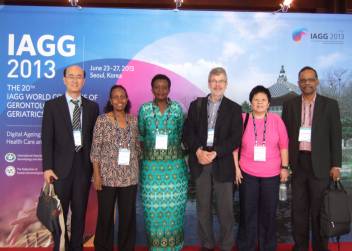 I have just returned from the 20th IAGG World Congress of Gerontology and Geriatrics in Seoul, Korea.
I have just returned from the 20th IAGG World Congress of Gerontology and Geriatrics in Seoul, Korea.
Of the many inspiring speeches and presentations from renowned academics, researchers and experts on ageing delivered at the IAGG, I would like to share one that really caught my attention.
Dr Shin Young-soo, Regional Director for the World Health Organization (WHO) for the Western Pacific spoke at great length and with optimism about population ageing.
Population ageing is an opportunity
His main point was that numbers of older people will double from 235 million in 2010 to 470 million in 2025. Population ageing will also happen more quickly in low- and middle-income countries. However, this should not be seen as a problem, but should be considered an opportunity. He further stated that population ageing is good news but the window time to act is short, saying “we must act now as we already know what we need to do”.
Commenting that ageing and health are not new issues, he reiterated WHO’s support in developing policies in the following areas:
- Building age-friendly environments
- Promoting healthy ageing across the life course and preventing disease among older people, as good life in old age largely depends on early life
- Promoting universal health coverage through age-friendly health systems
- Training health workers with appropriate skills
- Increasing the availability of essential medicines and health technology
- Ensuring equitable health financing
- Strengthening data on ageing and health
He continued by saying research needs to recognise that older people are not a homogeneous group and their needs should be analysed by their different characteristics, including gender.
We must challenge negative stereotypes of ageing
He concluded that if we act now our older people will enjoy health and an active later life. We need to challenge negative stereotype by investing in older people’s health. The focus should not necessarily be a longer life, but on adding life to years through good health.
The congress which was opened by the Prime Minister of South Korea also included welcome messages from the President of South Korea, Park Geun-hye and the UN Secretary General Ban Ki-moon. The IAGG is perhaps the only major global event that brings together representatives of government, academia and researchers to exchange information on global ageing issues.
The conference was attended by over 4,000 people from 89 countries and was perhaps among the world’s largest gatherings on ageing after the 2nd Madrid World Congress on Ageing was held in 2002. Africa was represented by 63 participants from 14 countries holding different research, academic and practical positions in the field of ageing.
The HelpAge International network was represented by a number of participants from the UK, Tanzania, Uganda and Kenya, as well as the Asia Pacific region. One of our global ambassadors, Dr Alex Kalache and two board members, Laura Mello Machado and Dr Isabella Aboderin were among the various discussants and presenters.
Dr Aboderin and Ms Machado were also among ten distinguished people who received the Presidential Award for their contribution to the IAGG in promoting geriatrics and gerontology around the world. Congratulations to both of them!
Ageing not included in post-2015 process
Age UK, Age International and HelpAge sponsored two sessions on the post-2015 process. They highlighted the lack of appropriate commitment to recognise population ageing as key determinants of the future MDGs and a new UN convention on the rights of older people.
I was able to draw quite a lot from the various sessions, as the key messages resonate with the programmes we are involved with in Tanzania. As a result, I can draw strength and enthusiasm from them to carry on with the positive initiatives we have started.
The conference also offered a great opportunity to meet a wide range of participants who specialise in various issues; from rights to literacy, health to livelihoods and capacity building. These meetings can hopefully lead to some fruitful collaborations as past events of this nature have.
Find out more about population ageing on our Global AgeWatch portal and by downloading our Ageing in the 21st Century report.
